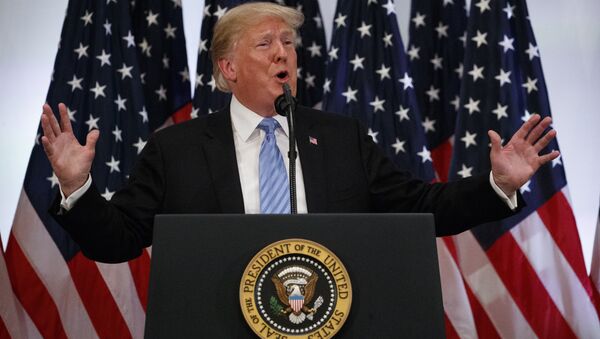James Gazzale, a spokesperson for the tax agency, released a statement saying that the department would be "vigorously pursuing all appropriate avenues of investigation."
The Times article alleges that Trump, his father, Fred Trump, and his siblings used various methods to evade paying pesky taxes on their fortune. The findings are based on thousands of confidential documents such as bank statements, accounting ledgers and financial audits obtained from former employees and advisers who worked with Fred Trump.
Striking at 45's image of being a self-made billionaire, the Times revealed that Trump had never just received a "small loan of a million dollars" from his father to kickstart his businesses. Rather, by the Times' math, Trump collected today's equivalent of at least $413 million from his father's real estate over the course of his life.
How was this done, you wonder?
Much of the funds were distributed via sham companies established to disguise monetary gifts being shelled out to various Trump family members, the Times reported. It was also noted that the Trumps dabbled in using tax deductions to make it appear as though their real estate holdings were worth less.
Investigative reporters found that Fred and his wife, Mary, sent more than $1 billion in wealth to their five children by using such fraudulent methods. Citing obtained records, the Times noted that the Trumps should've been subjected to New York's 55 percent tax rate on monetary gifts, but instead wound up paying just $52.2 million, which amounts to roughly 5 percent in taxes paid.
Other finds made by the publication reveal that in 1987, when 45's loan debt to his father was at least $11 million, rather than writing off the debt, Fred Trump shelled out some $15 million to buy a 7.5 percent stake in Trump Palace condominium building. Had papa Trump forgiven the debt, it would have caused POTUS to pay millions in income taxes, according to the Times.
By the time 1991 came around, Fred ultimately sold those same shares to Donald for $10,000, a practice that would typically catch the attention of the Internal Revenue Service, the report concluded. It did not.
Though Fred's tax returns fail to show any signs of a monetary gift to his son relating to the stake sale, they did reveal that "he used the transaction to declare an enormous tax write-off," the report states.
Charles Harder, a lawyer for Donald Trump, responded to the allegations made in the article, calling the claims "100 percent false and highly defamatory."
"There was no fraud or tax evasion by anyone. The facts upon which The Times bases its false allegations are extremely inaccurate," Harder told the outlet, before stressing that 45 was not involved in handling his parents' taxes, instead relying on family members and tax professionals. "President Trump had virtually no involvement whatsoever with these matters."
"The affairs were handled by other Trump family members who were not experts themselves and therefore relied entirely upon the aforementioned licensed professionals to ensure full compliance with the law," he added.
Though it's unlikely that a criminal case will be brought against Trump by the tax department, since the statute of limitations for tax evasion or similar charges has expired, there is a chance that civil fines could be imposed, as they carry no time limit.
Should the department launch a formal investigation, it would become the second to involve Trump and his family, according to CNBC. A probe was launched into the Trump Foundation in July after New York State Attorney General Barbara Underwood claimed that state and federal laws were broken via the mismanagement of the organization.
"Fred Trump has been gone for nearly twenty years and it’s sad to witness this misleading attack against the Trump family by the failing New York Times," the White House said on Tuesday. "Many decades ago the IRS [Internal Revenue Service] reviewed and signed off on these transactions."
Trump attorney Charles Harder told the newspaper that the tax fraud claims are false and highly defamatory. However, the Taxation Department of the US state of New York is investigating the claims, according to CNBC.





